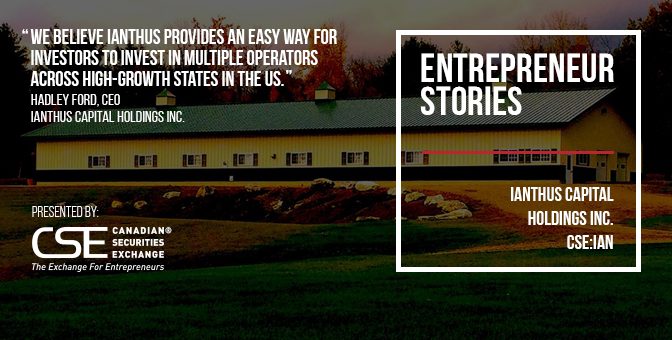Alex Freedman from the LA Department of Cannabis Regulation joins Barrington Miller for the inaugural #HashtagFinance Skype interview. This educational discussion focuses on the topic of ‘social equity’, including a definition of the term as it relates to the cannabis sector (2:00), how social equity works to have a positive impact on those negatively impacted by the “War on Drugs” (4:50), and the differences and similarities between social equity programs in Northern and Southern California (11:35). Listen until the end to learn about the challenges and opportunities facing community reinvestment from successful investee companies, navigating the long-term impact of social equity, and the growing demand for social equity mandates from cannabis investors!
Tag Archives: cannabis
Rosy Mondin on the Hard Road to Cannabis Legalization in Canada
Rosy Mondin, CEO of Quadron Cannatech (CSE:PUMP), sat down with Grace Pedota to share her story as a reformed lawyer and cannabis advocate and how her experience and passion led to the origin of Quadron Cannatech (3:00), the role she has played as a champion for cannabis within the tiers of Canadian government (9:30), and the circumstances that led her to build the “Boss” extractor (12:00). Listen until the end to hear Rosy’s plans for vape pens, hemp extraction, and the introduction of the “Big Boss” extractor!
Subscribe: iTunes / Spotify / Soundcloud / Stitcher / Google Play / RSS
Kim Rivers on Emulating the Whole Foods Retail Model in Cannabis | #HashtagFinance
Trulieve (CSE:TRUL) CEO Kim Rivers joined Grace Pedota during #WeedWeek to discuss the importance of inclusion as a value for the company and it’s “Trulievers” (3:00), the lessons learned becoming the first company approved to sell flower in Florida (8:00), and taking their expertise into new, competitive states in the U.S. (12:30). Listen until the end to hear how Trulieve is emulating the Whole Foods retail model, the importance of loyalty programs and data, and her pivot to the Cannabis industry as a recovering lawyer.
Subscribe: iTunes / Spotify / Stitcher / Google Play / RSS
Omar Khan on Navigating the Challenges of Marketing Cannabis | #HashtagFinance
Episode 3 — Hill+Knowlton Strategies’ Omar Khan sits down with Barrington Miller to discuss his perspective on the SNC Lavalin Affair (1:45), the challenges of marketing cannabis products (7:15), and his analysis of the Ontario cannabis lottery (11:45). Listen until the end to hear Omar’s thoughts on what the legal cannabis industry will need to do to bring more users over from the black market!
Subscribe: iTunes / Spotify / Stitcher / Google Play / RSS
Richard Carleton on Ushering the CSE into the Cannabis Era and Ukulele! | #HashtagFinance
Episode 2 — In this wide-ranging discussion with Canadian Securities Exchange CEO Richard Carleton, he shows Grace Pedota his chops on the ukulele, discusses the Exchange’s recent trip to Davos, Switzerland (5:15), and shares how the CSE embraced the cannabis industry (12:15). Listen until the end to hear Richard’s origin story as CSE’s CEO and for summer travelling tips!
Subscribe: iTunes / Spotify / Stitcher / Google Play / RSS
Women in weed: meet four women helping to shape Canada’s cannabis industry
It’s a common story thread: women entrepreneurs blazing the way for cannabis, taking over the sector and inserting themselves into a market that is booming, complicated and fast-evolving.
Stop. Back it up. Wait a moment. This is not one of those stories.
It’s an easy – perhaps a bit lazy – trend to latch onto, one that weaves itself through the cannabis daily news cycle. “Women in weed: charting change for male-dominated cannabis culture,” blared a CBC headline earlier this year.
This is not to say that women aren’t powerhouses in the world of cannabis. They are: just like they are in each and every other sector, when put in positions of power to do so.
In order to survive in this sector, you have to have strong chops, a killer resolve and the tenacity to do whatever it takes. It’s that entrepreneurial spirit that is key. Being a woman just happens to be one part of the equation.
Proactive Investors spoke to four women who touch different corners of the cannabis industry. From financiers to investment bankers, from equipment manufacturing to recreational advocates, we chatted about their past, predictions and what might roll out ahead.
Interviewees:
Meris Kott – CEO at Redfund Capital Corp.
Redfund Capital (RFND:future symbol) is a cannabis merchant bank that provides an alternative source of capital through a debt facility to bridge finance and helps revenue producing cannabis related companies build their valuation, and grow their company without diluting their equity prematurely, while helping move them toward being publicly listed.
Yasmin Gordon – Senior Investment Advisor at Canaccord Genuity
Yasmin Gordon is co-founder of the Gordon Group, as part of Canaccord Genuity Wealth Management, and advises private clients, corporate entities and institutional investors.
Rosy Mondin – CEO at Quadron Cannatech Corporation (CSE:QCC)
Quadron Cannatech (QCC) is a market and technology leader in end-to-end automated processing and extraction laboratory solutions for the international cannabis industry. QCC also provides a range of innovative value added services including custom ancillary products and cannabis accessories.
Ria Kitsch – VP Human Resources at Hiku Brands Company Ltd. (CSE:HIKU)
Hiku is a cannabis house brand. Hiku’s subsidiaries include Tokyo Smoke, DOJA, Van der Pop and Maïtri.
Q: Tell me about how you got into this industry. What led you here?
MK: I come from an investment banking family, which funded emerging market growth companies. About 12 years ago, we started looking at the cannabis industry, and we didn’t touch it, figured it wasn’t ever going to happen. We got into the industry in 2012, after Amendment 64 passed in Colorado. We’re now launching the first debt facility merchant bank, Redfund Capital Corp., focused on funding cannabis related revenue producing companies.
YG: I am a Senior Investment Advisor with Canaccord Financial, specializing in non-traditional wealth management strategies with a niche in providing financing opportunities. I came into the cannabis sector, quite honestly, out of necessity – I could see there was a shift occurring as we got more clarity with regard to full out legalization in Canada. I saw the opportunity and decided to add exposure in a more significant way. It’s been an exciting ride.
RM: As CEO of Quadron Cannatech, and a leading advocate for the legalization of recreational cannabis in Canada, I’m thrilled to be at the forefront of this emerging industry. I’m the director for the Cannabis Trade Alliance of Canada (CTAC) and I also serve as a Special Advisor to the Canadian Association of Medical Cannabis Dispensaries (CAMCD). In my role with CTAC, I work with industry leaders, government legislators and educators to develop an inclusive, safe, and ethical cannabis industry.
RK: I’m the vice president of HR at Hiku. Back in 2013, we saw an opportunity in getting into commercial cultivation, so we put in our application. We received our license to sell just this year. It’s been a long road but here we are. We merged with Tokyo Smoke in January. We then just recently merged with WeedMD in a pretty transformational transaction: combining a premium cannabis brand house and retail-focused operator.
Q: For some women, this might not be a sector that immediately comes to mind as a place to be. What advice would you give others who may not have considered this sector as a career path?
MK: Jump in! Because right now we’re creating a whole new industry. That said, it has changed and it’s become harder to break into the industry as a woman because it’s becoming more mainstream. Women are generally the chief medical officer in their family and looking at cannabis products more closely. I also think because it’s such a new industry people don’t consider it as a career path and it is still a risky avenue for work to some women.
RM: We are building a new industry – we currently have just over 100 Licensed Producers across Canada. If you think about most industries, 104 commercial licensees nationally in the sector is not a true industry. We are slowly seeing more ancillary businesses coming into the fold: legal, accounting, marketing, government relations, business development, branding, packaging – and banking (slowly). In addition, the cannabis industry has been operating in an under-regulated space (as there was no other option). Now there’s a lot of opportunity during this transition into the regulated market. There’s just so many areas that you can jump into as we build a whole industry so it’s really up to your own imagination as to which way you want to go and how to get your feet wet.
Q: What trends do you expect to see when recreational comes online later this year?
RM: I think the biggest shift will be the consumption of cannabis moving away from smoking traditional flower to products that are extract-based. Extracts form the basis for the majority of cannabis products outside of smoking: vapor-oils, capsules, tinctures, sublinguals, transdermal patches, edibles, topicals, suppositories, infused beverages. I have no doubt that we’ll see different consumption methods and further product innovation. I think the sky’s the limit.
MK: I’m going to wear my American hat here. I think we’re going to see a huge influx of American companies that have already been working with Canadian companies on many of their products, move more into the market. I think the Americans are going to flood our market with new brands, technologies and licensing agreements, as well as other countries who have approved recreational cannabis already. It can only help create a successful global marketplace.
YG: I see a shifting consciousness as to what legalization means for cannabis as many people will be forced to redefine what they know about the potential benefits of cannabis as a therapy option. You know I find it very interesting with my clients. There’s a divide in my book of clients: there are those that are for investment and those that still believe it’s a gateway drug. I believe perceptions will swing more positively as the public receives further education about the medicinal benefits of cannabis.
RK: It’s interesting when we talk about recreational. It’s a national movement that’s going to have so many ripples of effect. I’ve always believed that vaping and very clean, efficient methods are going to be preferred. However, we also believe that there’s a segment of the market, maybe 10% or so, that wants a curated strain and they want it in its entirety. It’s similar to going to a winery. You want to talk to a winemaker about how it’s grown, what it looks like, feels, tastes, etc.
Q: We’re seeing a lot more mergers and consolidations in the space. How do you differentiate yourself in a crowded market?
MK: In Canada, the companies are much smaller than other global players, although they are financed with plenty of capital. That said, you will see more consolidation between U.S. and Canadian companies. It is going to be about a recognized branded product first off.
RM: Like any industry, we’ll see consolidation, mergers, acquisitions and we’re going to see some businesses that will not make it – it’s the nature of any business. Look at the restaurant industry. It’s one thing to have a good idea: it’s another thing to actually execute it, using the restaurant example, understanding how to run a kitchen, avoid food-waste, or manage front-of-the-house. There will be consolidation, as licenses get scooped up through mergers. It’s just the normal course of a new and growing industry which continues to shift and evolve.
RK: There’s room for a range of different products in the competitive landscape. At the end of it, it’ll be key to have a really quality product, and maybe do fewer things but do them really well.
Q: If there’s one lesson you’ve learned in the industry, that you think other women should know, what would it be?
YG: Being aware of trends as an investor in the industry. It’s shifting so quickly. It’s almost mind-blowing. Retail investors need to be aware of how quickly the industry is transforming and the trends that are coming out that make a buy and hold strategy not likely the most effective way to play this market given the volatility we are witnessing.
RM: This is a 21st-century industry and women can play a leadership role from day one. For example, as a business leader in a new industry, I don’t think sitting back and just accepting the regulations at the government tables is acceptable. We’re getting out there and helping define the rules as the country moves forward. I think this kind of thing is really important. How do we encourage business investment and faith into the industry? I think having strong leadership, especially more women, can help.
MK: When I started in the industry it was two camps: medical marijuana and marijuana. Then we started talking about cannabis. It’s an industry now, a true marketplace. I think that from an entrepreneur’s point of view it’s become a cannabis investing haven. Just the fact that there are so many people involved, and that you can go on the CSE website and find a company directory in cannabis is exciting. There’s a mining sector, and now there’s a focused cannabis sector. Welcome to the industry. It’s not going anywhere.
RK: Don’t be afraid to be visionary. The industry is moving so quickly. Look to something you think you understand or that you can replicate with confidence. Another country, another model, don’t be afraid to try unique things. Don’t feel that you have to do what everyone else is already doing. The future is ours to create.
iAnthus Capital bordering on big things
The movement to legalise cannabis in a majority of US states is drawing interest from an expanding list of companies, as entrepreneurs sense opportunity in a market where growth is virtually guaranteed.
Currently, 29 US states have legalised the use of full-strength medical cannabis, with eight of those states allowing recreational use of the drug as well.
In all, 43 states allow some degree of cannabis use, meaning 93% of Americans live in a state that allows consumption.
According to the latest industry data, direct legal cannabis sales totalled US$7bln in the US in 2016 and by 2020 will reach around US$22bln.
However, although this looks like a good opportunity for businesses, the fact that cannabis is still illegal on a federal basis in the US makes it difficult for entrepreneurs to finance their operations.
This is where Canadian Securities Exchange-listed iAnthus Capital Holdings Inc (CNE:IAN, OTCQB:ITHUF) has stepped in.
“You have a strange anomaly in the US where cannabis is legal at the state level and illegal at the federal level,” says Hadley Ford, chief executive of iAnthus Capital.
“Citibank and Bank of America aren’t making any loans to cannabis operators, and the Goldman Sachs and Morgan Stanleys of the world aren’t taking anyone public.”
iAnthus, however, raises capital in Canada, where cannabis is legal for medical use at both the federal and provincial levels, and puts the cash to work in the US market.
That market is growing at a compound annual rate of over 30% so the returns on investment have the potential to be significant.
iAnthus, which has raised over C$50mln since its founding, has been putting money to work in Colorado, Vermont, New Mexico and Massachusetts, and is also in discussions pertaining to other high-growth markets.
TGS deal
In early February, iAnthus announced a strategic partnership with The Green Solution (TGS), a big player in the US cannabis industry.
TGS operates 12 dispensaries and integrated cultivation and processing facilities in the state of Colorado and has generated over US$150mln of cumulative revenue since its inception in 2010.
“The chance for us to work with TGS on strategic opportunities is very exciting,” said Ford. “TGS is a leader in cannabis and we look forward to seeing what we are able to do by working closely together.”
As part of the strategic relationship, TGS will provide iAnthus with retail expertise and advice on investments in Massachusetts, Vermont, New Mexico and Colorado.
iAnthus is providing a US$7.5mln credit facility to TGS which will be used to fund the build out of additional store locations. The facility runs for one year and carries an interest rate of 14% during the first four months, escalating to 23% thereafter.
To finance the credit facility, and also to provide cash for general corporate and working capital purposes, iAnthus closed a bought deal private placement at the end of February which raised gross proceeds of C$20mln. The deal was structured as a convertible debenture with an 8% coupon and convertible into common shares at a price of C$3.10 per share.
The stock, which also started trading on the OTCQB in early April, is currently changing hands for around US$2.00.
“If you are an investor, there are very few industries where you can pretty much have guaranteed top-line growth of 30% for the foreseeable future,” Ford points out. “There are not many ways for the public to play that opportunity. We believe iAnthus provides an easy way for investors to invest in multiple operators across high-growth states in the US.”
Ford says the group has put over US$19.1mln to work to date, and he thinks the opportunities for investors “look outstanding.”
Massachusetts interest
Aside from being excited about working with TGS in Colorado, Massachusetts is also high on Ford’s radar.
At the start of March, iAnthus said construction had begun on a state-of-the-art cannabis cultivation and processing facility for affiliate Mayflower Medicinals, Inc., a Massachusetts non-profit and cannabis dispensary licence holder.
The 36,000 square foot facility in Holliston is expected to have annual production capacity of 8,700 pounds, with the ability to supply over US$35mln of medical and retail sales. The company has spent US$2.1mln of the approximately US$10mln it will need to build out the cultivation, processing and store locations. “We have the necessary cash on our balance sheet today to complete the project,” notes Ford.
Ford calls Massachusetts the “Colorado of the East, but with less competition.” Mayflower has been awarded two of its three licences by the state, including one of the three dispensaries currently approved to open in Boston. A Boston ordinance provides that no other dispensaries can be opened within a half-mile of any dispensary currently approved by the City.
Ford believes that operations in Massachusetts should start generating revenue in the fourth quarter of this year.
Political risk limited
The election in November last year which made Donald Trump US President included referendums in a number of states on legalising cannabis in one form or another.
Even so, some people question the heightened political risks to the US cannabis industry caused by Trump’s presence in the White House.
Ford, however, plays down such fears, seeing no material change with Trump in power from the environment under President Barack Obama. “Obama could have decriminalized cannabis. He didn’t,” notes Ford.
Ford says the real issue is not one of politics, but of economics, with states like Colorado seeing a big tax boost and the cannabis industry serving as an important jobs provider.
“Nothing is going to stop the forward motion of the industry at this point,” Ford explains. “It doesn’t make sense politically, doesn’t make sense economically, and there just aren’t the federal resources available to roll back the progress that has been made in 29 states.”
iAnthus reported a small loss last year, but as it puts its capital to work it should ultimately see the business turn very cash generative. “When I look at some of the opportunities we have in the pipeline, the future looks very rosy from our perspective,” Ford concludes.
This story was originally published at www.proactiveinvestors.com on May 11, 2017 and featured in The CSE Quarterly.
Learn more about iAnthus Capital at http://www.ianthuscapital.com/ and on the CSE website at http://thecse.com/en/listings/life-sciences/ianthus-capital-holdings-inc.
Maricann looks to replicate Canada success in newly legal German cannabis market
Anyone looking for a model company in the medical cannabis sector would be well advised to consider Maricann Group Inc (CSE:MARI), as thus far it seems to have done everything right.
With a green ethos that drives both product development and corporate efficiency efforts, Maricann succeeded in becoming one of the first companies in Canada approved to cultivate and sell medical cannabis.
Not content with being an early mover in just its home market, Maricann was quick to stake its claim in another jurisdiction largely overlooked by its peers: Germany.
On the verge of turning a profit
The combination has the company predicting profitability by the second quarter of 2018. Its top line is off to a good start, with sales currently running at $450,000 per month. And having just announced a $42.5mln non-dilutive stream financing that will fully fund its German plans, Maricann is positioned to really put its foot on the accelerator.
The strategic mix of Canadian and European markets notwithstanding, Maricann chief executive officer Ben Ward sees the company’s key point of differentiation being technology for extraction and product formulation.
“We have locked up two groups with preparative chromatography expertise in cannabis and this means we have the only ability in the industry to get all the cannabinoids, terpenes and flavonoids,” says Ward. “To formulate the plant, you first have to be able to deconstruct it to make sure you get the active pharmaceutical ingredients.”
Ward explains that there are 500 terpenes – an organic compound found in numerous plant-based products – specific to the cannabis plant, and that companies looking only at cannabinoids or THC are missing much of what cannabis has to offer. “We are focusing on whole-plant medicine, which is done by extracting all of the different isolates.”
This approach to the industry reflects the direction set for the company early on by founder Dr Eric Silver. An assistant professor and clinical teacher in the Department of Family and Community Medicine at the University of Toronto, Dr Silver knew first-hand the benefits that alternative medicine employing cannabis could have on patients. The next step was to gather colleagues from the industry with capital and know-how and begin the search for a facility to purchase.
Eventually, the team settled on the Langton facility, which had been operating under the MMAR (Marihuana Medical Access Regulations) regime established in 2001.
The facility was approved under the more robust MMPR (Marihuana for Medical Purposes Regulations) in March 2014, with a license to sell product grown at the facility arriving in December of the same year.
A green ethos going hand-in-hand with the commercial imperative
A brief analysis of the facility indicates Maricann is committed both to being a custodian of its environment and running its business with an eye on costs. Langton has its own co-generation plant to help with electricity needs and there is even a natural gas well on the property to provide some of the fuel. Other efforts include equipment to capture rainwater for use in the fertigation process.
These and other efforts lead the company to believe that it is among the most competitive producers on the Canadian landscape, with per-gram costs estimated at just $1.37. That should translate into healthy margins that really make their presence known as sales continue to ramp up.
“Our revenue generating capacity right now is restricted only by our footprint of 34,000 square feet,” says Ward. “We are building a 216,000 square foot facility and that will be able to produce another 20,000 kg of dry flower starting in the first quarter of 2018.”
As far as near-term trends are concerned, Ward is in the camp of industry executives who believe smoking cannabis will give way to ingestion in other forms over time. “We think users will come to prefer extract-based products, which is the experience in more mature markets such as Colorado and California,” Ward notes. “Once people can access a product with a consistent extract in a dose they are used to, they will opt for that. We think that is when the real adoption will take place.”
Maricann is ready with its own line of gel caps, which it developed in partnership with another company, to help that trend along.
First we conquer Canada, then we take Berlin
The Canadian operations are clearly well on their way to developing serious momentum, and the plan is to create the same success in the German market.
It was only in January of this year that Germany’s lower house of parliament, the Bundestag, voted to legalize medical cannabis. The drug will be available from pharmacies to patients with a prescription, and importantly for companies serving the market it looks like it will be covered by German health insurance.
“I think we will see almost a carbon copy of the Health Canada program as far as cultivation and regulations are concerned. The difference will be in distribution,” posits Ward. “It won’t be supplied directly to patients but through major pharmaceutical companies or wholesalers, or distribution through pharmacies. Germany’s market will likely remain medical for a long time, but from an ease of access standpoint I think it will move ahead of Canada because of the German population’s propensity to seek alternative therapies.”
Ward explains that companies hoping to grow cannabis in Germany need to possess over three years of cultivation experience, a benchmark that the team at Maricann is able to meet. The company is currently preparing an initial 150,000 square feet of space in a facility that it has the option to purchase. “All we have to do is install the tables, the fertigation system and the lights and we will be operational,” says Ward. “We are moving through the licensing process there right now.”
Ward comments that the team is happy working in jurisdictions where legalization is uniform on a federal level, contrasting the environments in Canada and Germany to that in the United States, where cannabis is illegal federally but many states have passed laws to make it legal.
“Much of the rest of the world, and especially western Europe, is moving forward with legalization in some way,” observes Ward. “There is a much larger population that Canadian companies can export our experience to, and in doing so create best in class companies that compete globally. We might only be talking five or six years, but that is a lifetime of experience in the cannabis sector. I see Canadian companies moving into other markets and helping governments with regulatory issues so that their citizens can look forward to safe, reliable access to high-quality cannabis.”
This story was originally published at www.proactiveinvestors.com on May 10, 2017 and featured in The CSE Quarterly.Learn more about Maricann Group Inc. at https://www.maricann.com/ and on the CSE website at http://thecse.com/en/listings/life-sciences/maricann-group-inc.








